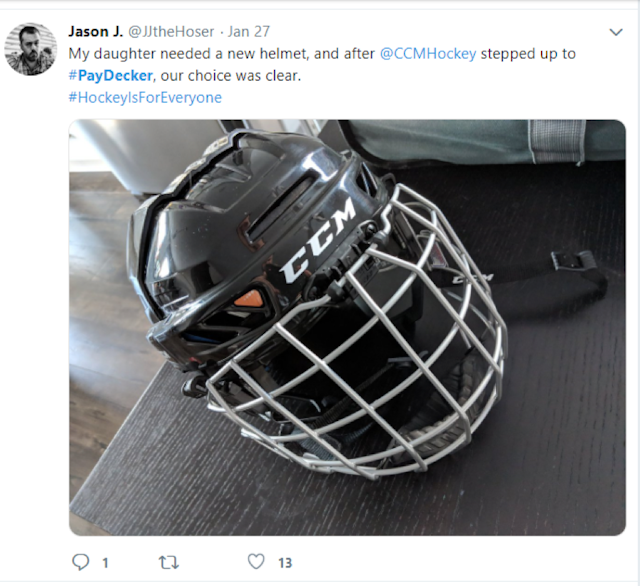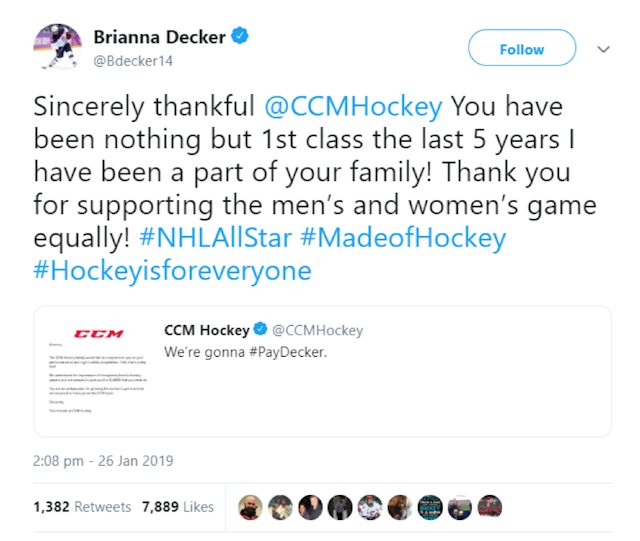Why bother to play if you’re not on the same field?
How brands can step up to tackle societal issues.
Derogatory. Sexist. Threatening.

/ Matthew Fournier
These are harsh, unpalatable, uncomfortable words, words which people don’t like to use. Yet they are words which many of us would use to classify the everyday social media coverage and commentary of women in the public eye.
So far, so (disappointingly) unsurprising.
But raise your head for a moment.
In January 2019, the US women’s national team hockey player Brianna Decker was brought out to demonstrate the premier passing drill at the NHL All-Star skills event. Decker completed the drill quickly and her time of 1:06 - which was deduced through social media - beat every other participant, including eight NHL players. As a demonstrator, rather than participant, however, it was Leon Draisaitl who completed the course in 1:09 who received the title and the USD$25,000 cash prize.
And with that, the #PayDecker emerged.
In the following 12 hours, over 5,000 positive tweets and retweets of support messages emerged on Twitter.

As wave after wave of public support washed over twitter, CCM, the hockey equipment manufacturer that sponsors Decker stepped up, announcing that they would pay her USD$25,000.

It was a reputational coup. NHL fans celebrated. They cheered CCM’s stance. And they endorsed their action, by acting with their wallet.

The cynics in us may find it easy to dismiss the move by CCM as the smallest of small gestures. A hat-tip towards gender equality and a blatant attempt to capitalise on the social media wave to capture the attention of a new group of customers.
But CCM’s stance rang true.
An existing advocate of the player, CCM had sponsored Decker for the past five years and built a strong relationship with her. Their decision to step-up wasn’t simply seen as a one-off, throwaway gesture by fans, but as part of who CCM was as a brand and what they stood for.
In short, they were perceived as having the authority and the authenticity to take a stance.
That stance meant CCM moved swiftly beyond what marketeers and researchers frequently herald as fundamental to the success of brands and businesses alike - the notion of brand purpose – to embrace brand activism.
This may seem like a small distinction in an age in which brand purpose has become agencies go-to explanation of what companies need to aim for, communicate and act upon. But when 92% of the UK population expect businesses to speak out on key social issues CCM’s actions show us is that in 2019 simply articulating your purpose, your reason to exist beyond making a profit, is no longer enough.
When the NHL failed to adhere to one of their own core values, that ‘hockey is for everyone’, CCM could have issued a press release stating their support of Decker. They could have joined in the uproar, condemned the action and ticked the ‘purpose’ box.
But they didn’t. They did something about it. They acted on their principles.
They demonstrated that brands and businesses have the opportunity to step-up and tackle broader societal issues when traditional intuitions fail.
And they showed that if #hockeyisforeveryone, the reward should be too.

Content by The Drum Network member:

Opinium
We help our clients harness the power of insight to build, grow, promote and make strategic business decisions. Find out more at www.mostconnectedbrands.com
Opinium...

